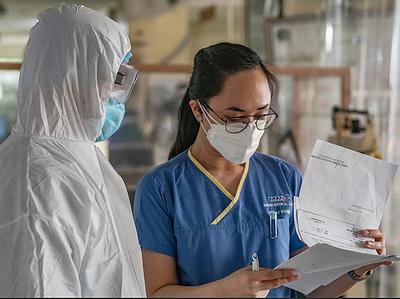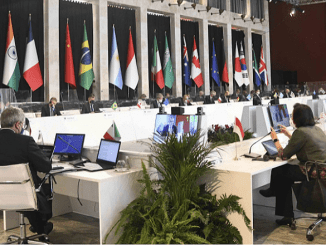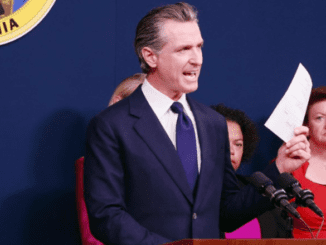
GENEVA, Switzerland, May 27, 2020 (ENS) – Forty million health professionals Tuesday sent a letter to the leaders of each of the G20 nations, calling for a healthy and green recovery from COVID-19. They advised that the G20 leaders invest in public health and involve their medical and scientific communities in developing stimulus packages to help their economies recover.
The G20 leaders who received the letter include heads of the four countries with the most deaths from COVID-19: the United States with 1.63 million cases, Brazil with 34,898 cases, Russia with 370,680 cases, and the United Kingdom with 265,231 cases.

Signing the letter on behalf of their members were more than 350 medical groups such as the World Medical Association, the British, Australian, Canadian, Indian, and Swedish Medical Associations, the International Council of Nurses, the World Organization of Family Doctors and the World Federation of Public Health Associations, along with over 4,500 individual health professionals from 90 different countries.
The letter asks the G20 governments to prioritize investments in public health, clean air, clean water and a stable climate in the economic stimulus packages currently under consideration.
Such investments would reduce air pollution and climate-warming emissions, which damage human health, build greater resilience to future pandemics, and simultaneously create more sustainable jobs, the health professionals write.
Dr. Miguel Jorge, president, World Medical Association said, “Health professionals are at the frontlines of this emergency, and we are seeing the immense loss of lives because of acting too late. We know now more than ever, that healthy lives depend on a healthy planet. As we walk on the road to recovery, we cannot ignore that we need to build a system in place that will protect us from further damage.”
“That is why it is important that governments take into consideration public health when they are discussing recovery packages. We need a comprehensive approach, a healthy and green recovery and we need it now,” Dr. Jorge said.
“Health professionals stand united in support of a pragmatic, science-based approach to managing the COVID-19 pandemic. In that same spirit, we also stand united in support of a #HealthyRecovery from this crisis,” the health professionals’ letter opens.
“We have witnessed first hand how fragile communities can be when their health, food security and freedom to work are interrupted by a common threat,” the letter states. “The layers of this ongoing tragedy are many, and magnified by inequality and underinvestment in public health systems. We have witnessed death, disease and mental distress at levels not seen for decades.”
“These effects could have been partially mitigated, or possibly even prevented by adequate investments in pandemic preparedness, public health and environmental stewardship. We must learn from these mistakes and come back stronger, healthier and more resilient,” the letter asserts.
To achieve this healthy recovery, leaders of the G20 countries must involve their medical and scientific community in developing the stimulus packages, the health professionals advise, writing, “These stimulus decisions must also take into account medical and scientific assessments of how the measures will impact public health in the short- and long-term.”

The letter states, “Before COVID-19, air pollution – primarily from traffic, inefficient residential energy use for cooking and heating, coal-fired power plants, the burning of solid waste, and agriculture practices – was already weakening our bodies. It increases the risk of developing, and the severity of: pneumonia, chronic obstructive pulmonary disease, lung cancer, heart disease and strokes, leading to seven million premature deaths each year.”
“A truly healthy recovery will not allow pollution to continue to cloud the air we breathe and the water we drink. It will not permit unabated climate change and deforestation, potentially unleashing new health threats upon vulnerable populations,” the health professionals advise the G20 leaders.
President of the Public Health Foundation of India Professor K. Srinath Reddy, emphasized, “Covid-19 highlights the dangers of wanton ecological despoliation that creates conveyor belts for viruses mostly contained within wildlife to become virulent pathogens for the human race. Air and water pollution erode our ability to withstand their invasion, because of lowered innate immunity and pre-existing damage to health that amplifies the harm that the virus can inflict on us.”
“It is a primer in environmental health lessons and a cautionary tale from which we must gain insights on how we reshape our future,” Reddy said. “If harmony with nature is broken, we are left with harm. Let us wisely co-exist to exist.”
World Health Organization Director-General Dr. Tedros Adhanom Ghebreyesus says he fully supports this move on the part of the 40 million health professionals.
“The human cost of COVID-19 has been devastating, and the so-called lockdown measures have turned lives upside down. But the pandemic has given us a glimpse of what our world could look like if we took the bold steps that are needed to curb climate change and air pollution,” Dr. Tedros said today.
“Our air and water can be clearer, our streets can be quieter and safer, and many of us have found new ways to work while spending more time with our families,” he said.
On Tuesday, the World Health Organization, WHO, published its manifesto for a green and healthy recovery from COVID-19, with six simple prescriptions:
First, protect nature, which is the source of the air, water and food on which human health depends.
Second, ensure that homes and health facilities have water and sanitation, access to clean and reliable energy, and are resilient to climate change.
Third, invest in a quick transition to clean energy that will cut air pollution, so that when COVID-19 has been defeated people can breathe clean air.
Fourth, promote healthy and sustainable food systems, to give people access to healthy and affordable food.
Fifth, build cities that integrate health into all aspects of urban planning, from sustainable transport systems to healthy housing.
And sixth, stop subsidizing fossil fuels that cause pollution and drive climate change.
Dr. Tedros said at today’s WHO daily coronavirus briefing, “As some countries start to re-open their societies and economies, the question we must answer is whether we will just return to the way things were, or whether we will learn the lessons the pandemic is teaching us about our relationship with our planet. Building back better means building back greener.”
The G20 is an international forum for the governments and central bank governors from 19 countries and the European Union. The 19 countries are Argentina, Australia, Brazil, Canada, China, Germany, France, India, Indonesia, Italy, Japan, Mexico, the Russian Federation, Saudi Arabia, South Africa, South Korea, Turkey, the United Kingdom and the United States.
Copyright Environment News Service (ENS) 2020. All rights reserved.
© 2020, Environment News Service. All rights reserved. Content may be quoted only with proper attribution and a direct link to the original article. Full reproduction is prohibited.



